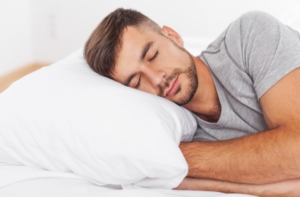Finding Your Path to a Restful Night’s Sleep
 Getting a restful night’s sleep is essential for overall well-being, and a good sleeping position plays a crucial role in achieving that. It helps maximize comfort, ensures proper spinal alignment, and alleviates neck pain. Neck pain can significantly affect sleep quality, leading to discomfort, restlessness, and even sleep disturbances. Choosing the right sleeping position can provide relief and improve sleep quality.
Getting a restful night’s sleep is essential for overall well-being, and a good sleeping position plays a crucial role in achieving that. It helps maximize comfort, ensures proper spinal alignment, and alleviates neck pain. Neck pain can significantly affect sleep quality, leading to discomfort, restlessness, and even sleep disturbances. Choosing the right sleeping position can provide relief and improve sleep quality.
Understanding Neck Pain
Neck pain can be provoked by multiple factors, including poor posture, muscle strain, injuries, arthritis, and underlying medical conditions. Understanding the root causes is essential to addressing the pain effectively. Recognizing common neck pain symptoms such as stiffness, soreness, limited range of motion, headaches, and radiating pain is crucial for identifying and managing the condition. Ignoring neck pain can lead to chronic discomfort and further complications. Seeking appropriate treatment and adopting suitable sleeping positions are essential to finding relief.
Factors to Consider for Choosing the Best Sleeping Position
- Alignment of the Spine
Maintaining the natural curvature of the spine is vital for proper spinal alignment. The chosen sleeping position should support this alignment to prevent strain on the neck and spine.
- Support for the Neck and Head
Adequate support for the neck and head is crucial for relieving neck pain. The sleeping position should allow the neck to remain neutral to reduce stress on the muscles and joints.
- Comfort and Personal Preference
While addressing spinal alignment and neck support is crucial, comfort and personal preference should also be considered. Experimenting with different positions can help identify the most comfortable option.
Sleeping Positions for Neck Pain Relief
- Sleeping on Your Back
 Sleeping on your back is often deemed the best position for neck pain relief. It allows the spine to maintain a neutral position, reducing strain on the neck and promoting proper alignment. Choosing a pillow that adequately supports the neck’s natural curvature and aligns with the head is essential. Placing a pillow under the knees can further enhance comfort and alignment. Adjusting the pillow’s height, using a rolled-up towel for additional neck support, and avoiding thick or overly firm pillows are important considerations for back sleepers with neck pain.
Sleeping on your back is often deemed the best position for neck pain relief. It allows the spine to maintain a neutral position, reducing strain on the neck and promoting proper alignment. Choosing a pillow that adequately supports the neck’s natural curvature and aligns with the head is essential. Placing a pillow under the knees can further enhance comfort and alignment. Adjusting the pillow’s height, using a rolled-up towel for additional neck support, and avoiding thick or overly firm pillows are important considerations for back sleepers with neck pain.
- Sleeping on Your Side
 Sleeping on your side is another favorable position for neck pain relief. It promotes spinal alignment and helps alleviate pressure on the neck and shoulders. A contoured or memory foam pillow that fills the gap between the neck and mattress is recommended. Placing a pillow between the knees can help maintain proper alignment and reduce strain on the lower back. Avoid placing the arm under the head, using a pillow that is neither too high nor too low, and ensuring the pillow adequately supports the neck are key considerations for side sleepers with neck pain.
Sleeping on your side is another favorable position for neck pain relief. It promotes spinal alignment and helps alleviate pressure on the neck and shoulders. A contoured or memory foam pillow that fills the gap between the neck and mattress is recommended. Placing a pillow between the knees can help maintain proper alignment and reduce strain on the lower back. Avoid placing the arm under the head, using a pillow that is neither too high nor too low, and ensuring the pillow adequately supports the neck are key considerations for side sleepers with neck pain.
- Sleeping in the Fetal Position
 Sleeping in the fetal position can benefit individuals with herniated discs or degenerative disc disease. It helps open up the space between the vertebrae and reduces pressure on the discs. A pillow to support the head and neck while tucking the knees toward the chest is essential. Experimenting with pillow thickness and firmness can help find the optimal support. Avoid curling up too tightly, as it can strain the joints. Individuals with arthritis or joint pain should consult a healthcare professional before adopting this position.
Sleeping in the fetal position can benefit individuals with herniated discs or degenerative disc disease. It helps open up the space between the vertebrae and reduces pressure on the discs. A pillow to support the head and neck while tucking the knees toward the chest is essential. Experimenting with pillow thickness and firmness can help find the optimal support. Avoid curling up too tightly, as it can strain the joints. Individuals with arthritis or joint pain should consult a healthcare professional before adopting this position.
- Sleeping on Your Stomach
Sleeping on your stomach is generally not recommended for neck pain relief, as it can strain the neck and spine. However, if this position is preferred, certain adjustments can be made to minimize discomfort. A thin pillow or no pillow is recommended to prevent excessive strain on the neck. Placing a pillow under the hips can help maintain proper spinal alignment. Individuals who experience neck pain in this position should consider transitioning to a different sleeping position to alleviate discomfort. Seeking professional advice is advisable for long-term relief.
Frequently Asked Questions (FAQs)
- How do sleeping positions affect neck pain?
The right sleeping position can help align the spine, relieve pressure on the neck, and promote proper support for the head. On the other hand, incorrect sleeping positions can strain the neck, exacerbate existing neck pain, and even lead to new pain or discomfort. Finding a suitable sleeping position that supports the natural curves of your spine and keeps your neck in a neutral position can help alleviate neck pain.
- Is it better to sleep without a pillow if you have neck pain?
Sleeping without a pillow is not generally recommended if you have neck pain. Pillows provide support and help maintain proper head, neck, and spine alignment during sleep. However, the type of pillow and its thickness can make a difference. Choosing a pillow that provides adequate support and conforms to the natural curvature of your neck. A pillow that is too high or too low can strain the neck and worsen the pain. Therefore, finding a pillow that suits your needs and promotes proper spinal alignment is best.
- Can the wrong pillow cause neck pain?
Yes, using the wrong pillow can cause or contribute to neck pain. An unsuitable pillow that doesn’t provide adequate support or doesn’t align with your sleeping position can strain the neck muscles and disrupt the natural curvature of the spine. For example, using a pillow that is too high or firm can lead to excessive neck flexion, while a pillow that is too low or soft may not provide enough support. Choosing a pillow that suits your specific needs, promotes proper alignment, and helps relieve pressure on the neck is important.
- Should I change my mattress if I have neck pain?
Your mattress can play a role in neck pain management. If your current mattress lacks adequate support or has become worn out, it may contribute to neck pain or discomfort. Changing your mattress to one with proper support and firmness can help alleviate neck pain. However, it’s important to note that individual preferences and specific conditions may vary, so consulting with a healthcare professional or mattress specialist is advisable to determine the best mattress for your needs.
- Can stretching exercises help relieve neck pain?
Yes, stretching exercises can be beneficial for relieving neck pain. Gentle stretching can help reduce muscle tension, improve flexibility, and promote blood circulation in the neck area. Some common neck stretches include neck tilts, side-to-side head rotations, and chin tucks. It’s important to perform these exercises properly and avoid sudden or forceful movements. If you have severe or persistent neck pain, it’s advisable to consult with a professional who can guide you through appropriate stretching exercises for your specific condition.
Remember, while these answers provide general guidance, it’s essential to consider individual factors and consult with a healthcare professional for personalized advice regarding your neck pain and sleep-related concerns.
Conclusion
Sleeping on your back, side, or fetal position is recommended for individuals seeking relief from neck pain. Consistently practicing a suitable sleeping position and experimenting with different pillows and mattresses can help individuals find the optimal solution for their neck pain. If neck pain persists or worsens despite adopting appropriate sleeping positions and strategies, seeking professional advice from a healthcare provider or physical therapist is highly recommended.

At Precise Chiropractic & Rehabilitation, Dr. Hands, your dedicated chiropractor, is committed to relieving your pain and enhancing your quality of life.
Contact Us!
Precise Chiropractic & Rehabilitation
2191 Defense Highway, Suite 222
Crofton, MD 21114
Phone: (410) 370-0600
Opening Hours
| Monday | 12:00pm | 6:00pm |
| Tuesday | 7:30pm | 2:00pm |
| Wednesday | By | Appointment |
| Thursday | 12:00pm | 6:00pm |
| Friday | 7:30am | 2:00pm |
| Saturday | Closed | Closed |
| Sunday | Closed | Closed |


